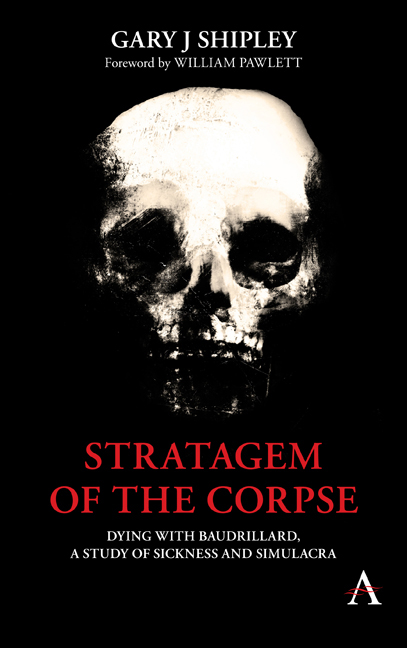Book contents
- Frontmatter
- Dedication
- Contents
- Acknowledgements
- Foreword by Pawletts William
- Introduction
- Chapter 1 On Decay and Other Synthetics
- Chapter 2 Stratagem of the Corpse
- Chapter 3 A Bleak Non-History of History
- Chapter 4 The Hyperactivity of Objects
- Chapter 5 The Unnamable Catastrophe
- Chapter 6 A Cure for Vertigo
- Chapter 7 Chance and the Temporality of Death
- Chapter 8 The Possibility of Nihilism
- Chapter 9 Smell-O-Vision: The Murder Show
- Chapter 10 The Evil Death
- Chapter 11 False Confessions and the Madness of Death: Making Death Speak
- Chapter 12 Black Light: Nigredo and Catastrophe
- Appendix 1 Whiteout: Spatiotemporal Interstices, Necropresence and the Immortality of Now
- Appendix 2 Pure Dreaming: Radicalized and Vermiculated Thought, or Death as an Earworm
- Appendix 3 The Non-Existence of the Scream
- Index
Chapter 11 - False Confessions and the Madness of Death: Making Death Speak
Published online by Cambridge University Press: 20 February 2020
- Frontmatter
- Dedication
- Contents
- Acknowledgements
- Foreword by Pawletts William
- Introduction
- Chapter 1 On Decay and Other Synthetics
- Chapter 2 Stratagem of the Corpse
- Chapter 3 A Bleak Non-History of History
- Chapter 4 The Hyperactivity of Objects
- Chapter 5 The Unnamable Catastrophe
- Chapter 6 A Cure for Vertigo
- Chapter 7 Chance and the Temporality of Death
- Chapter 8 The Possibility of Nihilism
- Chapter 9 Smell-O-Vision: The Murder Show
- Chapter 10 The Evil Death
- Chapter 11 False Confessions and the Madness of Death: Making Death Speak
- Chapter 12 Black Light: Nigredo and Catastrophe
- Appendix 1 Whiteout: Spatiotemporal Interstices, Necropresence and the Immortality of Now
- Appendix 2 Pure Dreaming: Radicalized and Vermiculated Thought, or Death as an Earworm
- Appendix 3 The Non-Existence of the Scream
- Index
Summary
Philip K. Dick's madness was in imagining a substratum, a cause of the causes he’d already found (a cause in that cause, for ‘the world […] lacks nothing’), the concentrated obtrusion of evil's implosion that is not itself evil or even susceptible to moral judgements or humanization, a substratum that was instead free of us and of the sickness of the world it caused evil to produce. Was it a weakness to unearth evil there in the roots and the soil around them and yet still keep digging? When the world has confessed, what is the use of torture? Unless perhaps that use is torture striking out on its own, as if it were somehow pre-eminent, as if evil were its supplement and not the other way round. And so, yes, there is no evading this allegation of weakness, but then what is weakness when strength has become the purest inertia, and thereby unattainable? Hence death is its own weakness and its own madness, its own flight from evil into its earth and beyond it.
While our dream for death is oppositional, it can conceive of no real opposite, for there isn't one. A negation, a reflection, an inversion: none of them will suffice. This opposite is not some mere distortion of the original. The world has no opposite, which is the precise reason why it's safe to dream it, and the reason too that death is never quite the solution it often appears to be, whatever the evil underpinnings of life, because it is still life even when it's gone, because death did not replace it, it merely made it disappear in some kind of conjuring trick, and left us like dupes waiting for its return.
Although we are not able to distinguish the world's opposite from the world it stands in opposition to, the difference is there, postulated behind it: a benevolence, an infrastructural absence behind the hologram – not a thing of feebleness but of health and violence. Where we want to find the opposite is where Dick didn't find it, where he found evil instead and, worse still, disinterest; and what we want to find is not this ubiquity, this plateauing of aberration and insignificance but just the merest indication that a detour is possible, that our tenure as animals is up, because while ‘we cannot make the world the object of our desires, we can at least make it the object of a higher convention – which, precisely, eludes our desire’.
- Type
- Chapter
- Information
- Stratagem of the CorpseDying with Baudrillard, a Study of Sickness and Simulacra, pp. 141 - 168Publisher: Anthem PressPrint publication year: 2020



